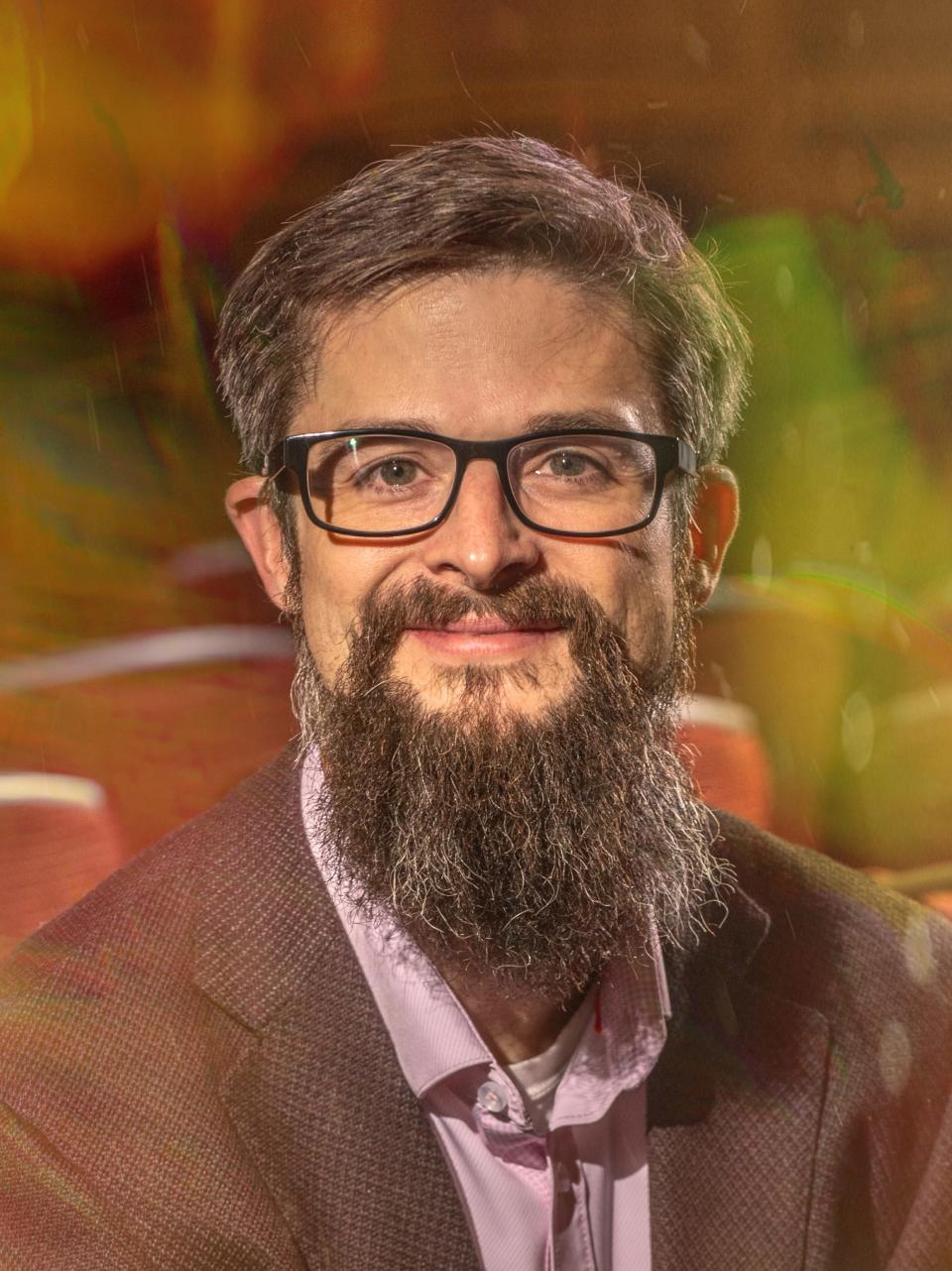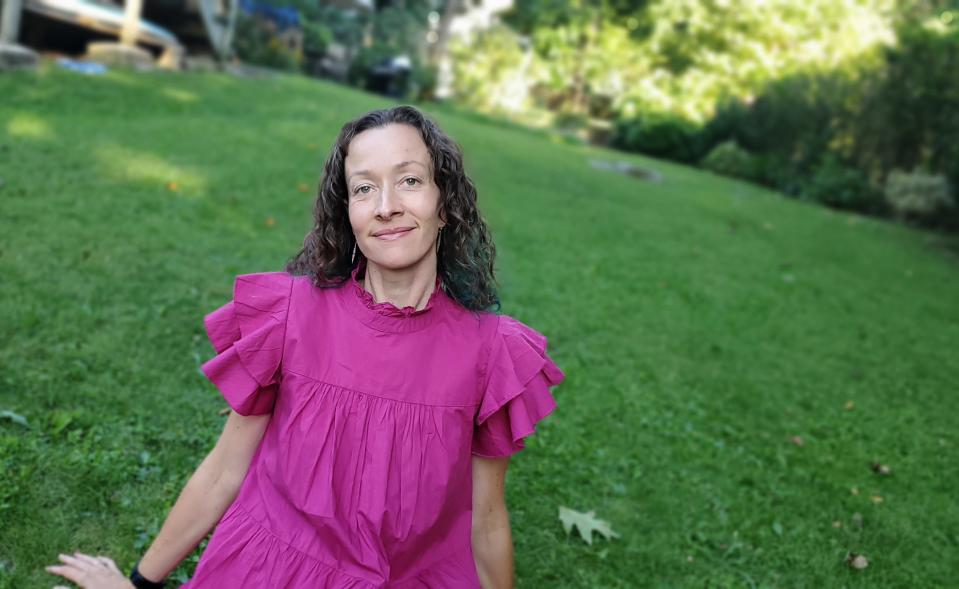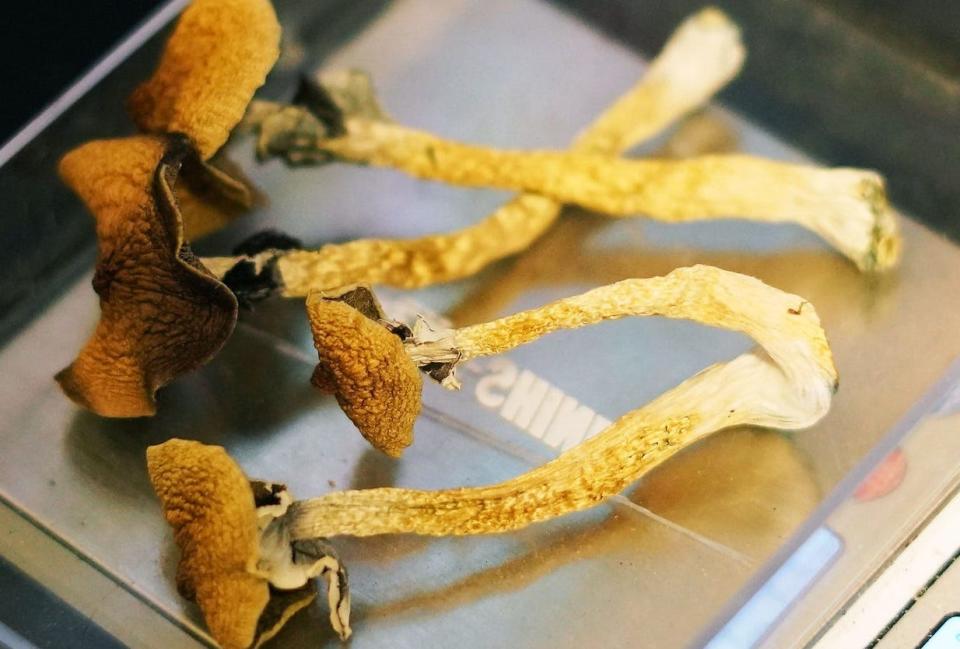Can psilocybin combat mental health issues? How magic mushrooms show promise in fighting addiction.
- Oops!Something went wrong.Please try again later.
Nicola d'Alessandro stopped drinking when she was 23. She stayed sober for 11 years until, as a young mom in suburban New York, she decided she was mature enough to drink socially again.
It didn't take her long to realize she wasn't.
The next few years she spent either downing a beer or thinking about when she could get the next one.
She found herself yelling at her preschoolers. She couldn't sleep. She'd wake up with hangovers. There were days when she'd manage not to drink but many others when she couldn't.
It was when d'Alessandro started turning to harder alcohol that she got scared. Younger encounters with alcohol had led to her being "covered in bruises, making terrible decisions, putting myself in risky situations in New York City."
"This is going to end in total disaster," she thought. "It was so obvious to me but really hard to fix."
D'Alessandro spent close to a year seeing two different therapists who specialized in treating addictions. But that didn't make a dent in her drinking, nor did a stint in Alcoholics Anonymous.
Frustrated, she decided to join an alcohol addiction study at the New York University Langone Center for Psychedelic Medicine in New York City. The study offered 12 therapy sessions and two – later three – experiences with psilocybin, more commonly called "magic mushrooms," because the natural form comes from a fungus. The results were published Wednesday in the journal JAMA Psychiatry.
Research interest in psilocybin and other psychedelics has been growing, with studies exploring ketamine, MDMA, psilocybin and LSD, among others, to treat a wide range of conditions, such as post-traumatic stress disorder, alcohol, drug and tobacco addiction, depression, anorexia, migraine and the fear of death among cancer patients.
"This work has become extremely mainstream," said Matthew Johnson, a leader in the field and a professor of Psychiatry and Behavioral Sciences at Johns Hopkins Medicine.
Dr. George Koob, director of the National Institute on Alcohol Abuse and Alcoholism, said the studies on psychedelics and addiction remain early and inconclusive but seem promising.
"There are people who just don't respond to conventional treatment and if this would help them that would be wonderful," Koob said. "As the evidence mounts, which it is in a number of domains, we're definitely interested in supporting further study."
Alcohol use disorder climbed from 8.5% of the American population in 2001-2002 to 12.9% a decade later and has likely kept rising since. Treatments aren't particularly effective, data shows.
It's unclear how many people with alcohol use disorder manage to beat their addiction, Koob said, because “until recently, we’ve lacked a standard definition of the term 'recovery.'" The agency's "current best estimate" is that between 6% and 9% stop drinking heavily or at all at some point in their lives.
Psychedelic therapy: The next big trend in mental health treatments?
A guided experience
At their worst, psychedelics can cause people to lose touch with reality, misinterpret the world, or do things that are harmful, like walking into traffic, said NYU Langone Health psychiatrist Michael Bogenschutz, who led the new trial. Research studies on psychedelics so far have all been small, but none has shown significant safety concerns, he said.
Most of the bad trips that drew attention in the 1960s happened when people used psychedelics without supervision or in combination with alcohol or other drugs, Johnson said.

Psychedelics should be avoided by people with certain medical conditions, such as schizophrenia, Johnson said, because they could potentially cause a psychotic break with reality, and for those with heart disease so severe they can't handle the modest increase in blood pressure psychedelics can trigger. ("Garden-variety controlled hypertension" is fine, he said.)
Context matters, both Johnson and Bogenschutz said. A trip taken alone in a harsh environment might be destructive.
So the 48 people in Bogenschutz's study, including d'Alessandro, each got four weeks of therapy first, to build a trusting rapport with the therapist who would remain with them throughout the journey. They had another four therapy sessions before the second dose of psilocybin and four more after.
The control group of 52 people got the same number of therapy sessions but were given the antihistamine Benadryl, rather than a psychedelic. It's tough to use placebos in psychedelic research because most people can quickly tell if they've gotten the active medication, Koob said.
D'Alessandro swallowed a pill of synthetic psilocybin – which allows for a more predictable dose than a mushroom – and then laid down on a comfortable couch in a windowless room. She was given a comforter, an eye mask and headphones playing soft music, so she could tune out the world and tune into her own experiences.

At one point during the second psilocybin session, d'Alessandro said she became deeply afraid. She reached out to the therapist who took her hand, enabling her to feel calm and safe, allowing her "brain the freedom to do what it needed to do."
Given a slightly higher dose for the second session, d'Alessandro said she wasn't sure if she was awake or asleep, but like many others who take psychedelics, she developed synesthesia, a disruption of the senses. "Sound was color, taste was smell. Everything was really jumbled and mixed up. I didn't have language anymore," she remembered. "There were no words or sentences or concepts … It was very confusing."
After the first medication session, d'Alessandro realized her desire for alcohol had disappeared. She felt about it the way, as a vegetarian, she doesn't crave meat if someone eats a big steak right next to her. "It's like a part of my brain was changed or removed or fixed," she said.
She had gone into that first session hoping it would allow her to drink socially, but it made her realize "that's not me," she said. "Alcohol is poison to me."
For the second session, her goal was to learn to remain sober. "I just wanted to live differently, without this horrible poison ruining my life."
Changing perception
Research into psychedelics took off during the 1950s and 1960s, but the field was discredited by its role in the counterculture. In 1970, psychedelics were classified as Schedule I drugs under the federal Controlled Substances Act, meaning they were considered to have high abuse potential, no accepted medical use and were unsafe even under medical supervision.
Over the following decades, there was a "complete professional marginalization of the area," Johnson said. "The government wasn't interested in therapeutic work with this. Philanthropy wasn't." When he announced early in his career that he planned to research psychedelics, mentors repeatedly told Johnson he was throwing away his future.
But he was drawn to the field, he said, because existing treatments left so many people without help for mental health challenges.
Bogenschutz tells a similar story.
In 2012, he saw a paper that compiled previous research using lysergic acid diethylamide, better known as LSD, to treat alcohol use disorder. The studies were all small and some were problematic, but they showed a clear benefit. So Bogenschutz began leading clinical trials using psychedelics, including psilocybin.

Though not identical, psychedelics seem to mimic serotonin, a brain chemical known to be involved in carrying messages among nerve cells.
Some psychedelics, like intravenous dimethyltryptamine or DMT, produce effects for only about 15 minutes, which may be too short to offer clinical benefit, Bogenschutz said. LSD sends people on "trips" lasting eight to 10 hours, which is a long time for a clinician to supervise a patient. Psilocybin acts for about five hours, he said, which is more practical for psychiatric treatment.
Despite the public perception, psychedelics are not habit-forming, like heroin, cocaine, or alcohol, Bogenschutz said. An animal given the choice will not press a lever to get a second dose or hang out in the part of its cage where it thinks it'll get another hit. "If anything, they're aversive" to repeated doses, he said.
And psychedelics don't reliably make people feel good. Experiences can be intense, frightening and painful.
During her first psilocybin session, d'Alessandro remembers sobbing and hearing lots of screaming in her head.
She compares it to what she imagines would be the emotional and physical challenge of climbing Mount Everest naked and barefoot. And "when you get to the top, all kinds of crazy things happen."

New frontier
Bogenschutz's new study found that 48 people who received the active therapy drank fewer than 10 days a month, while the 45 who received the antihistamine continued to drink heavily for 23 days a month. Those who took the psychedelic also drank less on their drinking days than those who got the placebo. Both groups were followed for 32 weeks.
The medication, Bogenschutz said, expands the ability of people to change, loosening the functional organization of their brain networks and opening up possibilities. Providing therapy helps people make use of that opportunity, he said.
Given psilocybin without their knowledge or the therapy, he thinks the desire for alcohol wouldn't disappear. "The drug enhances the capacity to change and therapy helps direct it," he said.
Researchers don't know whether treating other mental health conditions requires a different "dose" of therapy or psilocybin. In his next study, hopefully beginning early next year, Bogenschutz plans to test far more people with alcohol use disorder at 15 different institutions and with only one dose of psilocybin.
"It will be very important to figure out what is necessary and what is enough," he said. "There's a real risk that in the interest of trimming costs, we end up with a model that is not safe or not effective." Fewer therapy and medication sessions would make it easier to help more people, he said.
Koob questions "whether this will ultimately be cost-effective, given how much therapists' time is involved."
But Bogenschutz notes that standard addiction treatment already includes 12 therapy sessions and only 3% to 4% of people with alcohol use disorder receive one of three medications, none of which has proven particularly effective.
Bogenschutz wants to understand whether the intensity of someone's initial experience determines how much they'll improve. "We need to still be skeptical about that and do larger studies to be able to answer mechanistic studies," he said.
Although d'Alessandro stopped drinking after the first psilocybin session, she felt she needed all three for the experience and change to feel complete. Her depression had lifted by the end and without that, she might have been led back to alcohol. "I needed the three to learn what I learned," she said. "I processed so much anger and trauma and sadness."
The third was the most uplifting and in a way, the most powerful. "I was able to learn about love and the amazingness of the world and the universe and now I can live with that knowledge and it's amazing and it helps me every day," she said.
She wouldn't turn down another session at some point but doesn't feel the need for it.
D'Alessandro, 43, who joined the study in 2019 and remains sober, considers herself more loving and a better parent to her two children, now 5 and 7.
If she hadn't been through the treatment before the pandemic, she said, "it would have been really bad for me."
D'Alessandro wants to talk about her experience in the psilocybin trial both because it keeps its effects fresh and "present in my life," she said, and because she hopes it might help someone else. "If people know this is a possibility that they too have an opportunity to heal, to make the change they want, that's really wonderful."
"I'm deeply grateful," she said, softly crying. "I was in the right place at the right time to have this opportunity to heal."
Contact Karen Weintraub at kweintraub@usatoday.com.
Health and patient safety coverage at USA TODAY is made possible in part by a grant from the Masimo Foundation for Ethics, Innovation and Competition in Healthcare. The Masimo Foundation does not provide editorial input.
This article originally appeared on USA TODAY: Psilocybin mushrooms show potential to fight alcohol addiction: study

